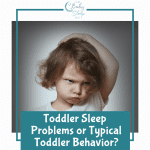
Here’s a myth that needs to be debunked: sleep problems go away when babies grow into toddlers. After working with over 50,000 families over the last 15+ years, we’ve learned that’s simply not true! Yes, some babies will outgrow their sleep problems, but far more babies who take short naps and wake often at night simply grow into toddlers who take short naps and wake often at night. Here’s something else: while some sleep problems are universal, regardless of your baby’s age, other sleep problems are unique to toddlerhood. That’s why it’s key to know what kinds of toddler sleep issues you may be facing as your baby enters the toddler years. Keep reading to learn the top 9 toddler sleep problems, and how to cope.
9 Common Toddler Sleep Problems (And How To Cope With Them)
1. Jack-in-the-Box Behavior
Once your toddler is out of his crib and into a big-kid bed, you’ll most likely have at least a little bit of what we call jack-in-the-box behavior. Your toddler will spring out of bed, and you’ll have to tuck him back in. For some toddlers, though, this problem is incredibly persistent! To deal with this, simply out-persistent your persistent child. Do what we call the “silent return to bed.” EVERY time your child gets up, calmly and quietly return him to bed. Don’t engage, or let your child see you upset. If your toddler can get a reaction out of you, he’s more likely to repeat the behavior.
2. Short (or Skipped) Naps
There are several big nap transitions during toddlerhood!
Your toddler will transition from two naps to one nap at around 15-18 months, and then your toddler will be done napping somewhere between 3 and 4 years of age. These nap transitions can take quite a toll. Many toddlers will have short, late, or skipped naps during the transition phase, which can lead to overtired crankiness and bedtime drama.
Pro Tip: Do NOT transition to one nap until you see the 5 signs of transitioning to one nap!
You may also be interested in…
3. Bedtime (and Nap Time) Stalling
Some toddlers are practically professional bedtime stallers. Just one more drink, just one more book, just one more kiss for all 50 of her stuffed animal friends….you get the idea! Take heart, though – while this is a very frustrating problem, it’s also incredibly common. To deal with bedtime stalling, check out the tips and techniques in our article, 5 Gentle Techniques for Managing Toddler Bedtime Stalling.
4. Separation anxiety
Separation anxiety first surfaces during babyhood, around 7 months old and has peaks and valleys throughout childhood. Many parents see a peak resurgence around 18 months and then again around 2 years of age.
Separation anxiety on its own is bad enough (because it is just plain heartbreaking to have to leave a sobbing baby at daycare drop-off!). But it can be a real problem at bedtime and nap time. For help with separation anxiety, take a look at this article on How To Handle Separation Anxiety and Sleep.
5. Bedtime Anxiety and Fear
Your toddler has a budding imagination, which is great! But that budding imagination can create bedtime fears, which in turn can make bedtime an anxious time. For more insights into why your child has nighttime fears, as well as how you can help alleviate those fears, check out this helpful article about nighttime phobias.
6. Wide-Awake at Bedtime
Oh, man – I think all of us have dealt with this one! The clock says bedtime, you’ve gone through the bedtime routine….but your toddler is showing NO signs of being ready to sleep! This is a very common problem during toddlerhood, and it usually has to do with your toddler’s schedule.
If your toddler still naps, then you may actually need a later bedtime, as opposed to an earlier bedtime. Toddlers who still take an afternoon nap, for example, need at least 5 hours of awake time between the end of the nap and bedtime. So if your toddler’s nap ends at 3:30, you’re looking at an 8:30 bedtime, for example. As children get older, they often increase their wake windows to 5 1/2 to 6 hours or more, too. It can be even worse in the summer when the sun is setting late!
7. Nightmares and/or Night Terrors
Remember that budding imagination I mentioned earlier, that causes nighttime fear and anxiety? Well, it also causes nightmares (and, for some toddlers, night terrors). Nightmares and night terrors are very common during the toddler years. However, they can be really tough on sleep (your toddler’s AND yours!). Fortunately, we have tips! Check out our Nightmare and Night Terror series.
8. Middle-of-the-Night Munchies
This won’t affect every toddler, but it affects enough that I added it to the list. Many parents find, as their toddlers grow, that middle-of-the-night hunger becomes increasingly problematic, again. The reason? Simple – your likely active toddler is growing and burning a lot of calories! This problem is usually fixed by a healthy bedtime snack – just be sure it is low in sugar, and be sure your toddler brushes his teeth afterward. You can see more tips for helping your toddler sleep through the night in this toddler sleep training article.
9. Early-Morning Waking
Again, this won’t be a problem for every toddler. But for some families, their toddler’s early waking becomes a huge problem. The causes behind toddler early waking are varied. Some toddlers simply need less nap sleep (which translates into more nighttime sleep and a later wake-up time), while others wake early because their rooms are too bright (a problem which can be solved by black-out curtains). Still, other toddlers wake early because they are just excited to start the day!
One thing that can really help in general with early waking is a toddler clock. These clocks display lights or symbols that let your toddler know when she should stay in bed, and when she should get up. We like the Okay to Wake Clock, but there are many others you could try.








